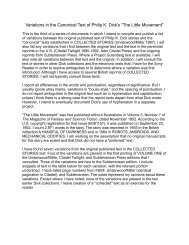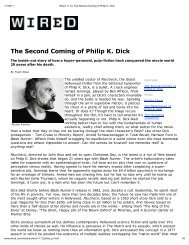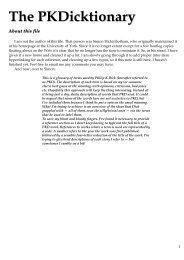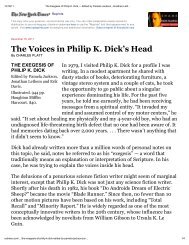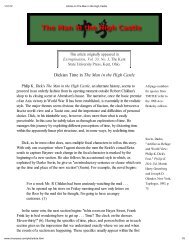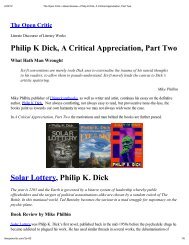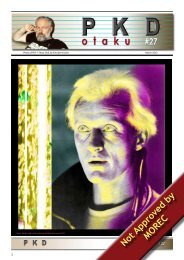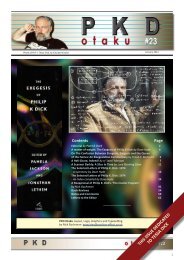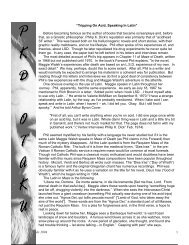Hermenaut - Philip K. Dick Fan Site
Hermenaut - Philip K. Dick Fan Site
Hermenaut - Philip K. Dick Fan Site
You also want an ePaper? Increase the reach of your titles
YUMPU automatically turns print PDFs into web optimized ePapers that Google loves.
2/25/12 <strong>Hermenaut</strong>: <strong>Philip</strong> K. <strong>Dick</strong> | HiLobrow<br />
flawed creation of an evil demiurge. Ours is an occluded existence, whose true reality is obscured by, among other things,<br />
“spurious memories & hallucinated (irreal) worlds.” The recent <strong>Dick</strong> rip-off movie The Truman Show ends with Jim Carrey<br />
stepping through the illusionary horizon into the real world, but for <strong>Dick</strong> this kind of happy ending is never an option. There is no<br />
reality behind the irreal.<br />
How, then, can the authentic person “bounce back, absorb, and deal with” the ever-new which for <strong>Dick</strong> is reality? “Reality, to me,<br />
is not so much something that you perceive, but something you make,” he says in “The Android and the Human.” Not make as in<br />
“make into a system” — what <strong>Dick</strong> means is that reality (as opposed to the irreality which passes for reality) is always something<br />
that is in the making, by us. The real arises in the making of the real, in the constant “fast shuffling of possibility after possibility.”<br />
Truth is not hidden, for us to discover, according to “The Android and the Human” — it’s “what you do with the bits and pieces of<br />
meaningless, puzzling, disappointing, even cruel and crushing fragments all around us that seem to be pieces left over, discarded,<br />
from another world entirely that did, maybe, make sense.”<br />
This explains why the humble heroes of so many of <strong>Dick</strong>’s books are artificers, “variable” men, and repairmen: They are all, in their<br />
humble way, creators and not destroyers. This also, I think, explains <strong>Dick</strong>’s defense of trash (to Lem, above), his late-’60s boast<br />
that he was spending “most of [my] time listening to first Scarlatti and then the Jefferson Airplane and the Gotterdämmerung, in an<br />
attempt to fit them all together,” and the final paragraph of Valis, in which the narrator (<strong>Dick</strong>) stations himself in front of the TV,<br />
waiting for a sign. Reality may be just a simulation, but the “fake” — the flotsam and jetsam of pop culture — may turn out to be<br />
the bricks and mortar with which we can construct our own reality.<br />
What Shall We Do?<br />
“I mean, after all, you have to consider, we’re only made of dust. That’s admittedly not much to go on and we<br />
shouldn’t forget that. But even considering… we’re not doing too bad. So I personally have faith that even in this<br />
lousy situation we’re faced with we can make it. You get me?” — interoffice memo from Barney Mayerson, in The<br />
Three Stigmata of Palmer Eldritch (1965)<br />
<strong>Dick</strong> writes, about the above memo, that he wrote Palmer Eldritch for no other reason than to provide background context for<br />
this, his statement of faith “not so much in God, either a good god or a bad god or both-but in ourselves.” Which is great, and<br />
everything… but if the answer to “What is Real?” is “Nothing, except what we make ourselves,” how are we supposed to<br />
proceed? We already know, of course, that (as he says in his Afterword to The Golden Man) <strong>Dick</strong>’s “anger is generated out of<br />
love; it is love baffled,” and that for <strong>Dick</strong> the little virtues — “love, making exceptions, humor, determination” — are vital, but once<br />
we’ve become lucidly aware of the irreality in which we live, how can we move from empathy to action?<br />
In his 1974 essay “Who Is an SF Writer?” <strong>Dick</strong> suggests that “the sf writer is able to dissolve the normal absolute quality that the<br />
objects (our actual environment, our daily routine) have; he has cut us loose enough to put us in a third space, neither the concrete<br />
nor the abstract, but something unique, something connected to both and hence relevant… the daily tyranny of our immediate<br />
world, which we generally succumb to, becoming passive in the hands of and accepting as immutable, this is broken, this tyranny of<br />
concrete reality.” For <strong>Dick</strong>, despite the fact that the “normal absolute” reality is not as concrete as it seems, the passivity of nihilism<br />
is not acceptable; in fact, waking up to irreality is energizing. This is the other central theme of Electric Sheep (and Martian Time-<br />
Slip, and The Penultimate Truth, among others): Never surrender. “I can’t stand the way you androids give up,” Deckard tells<br />
the android Rachel, who passively waits for him to kill her — why wasn’t this scene in the movie?<br />
Besides empathy, then, for <strong>Dick</strong> a cranky stubbornness is the most vital quality a person can have. In a 1970 letter, <strong>Dick</strong> writes<br />
that “I know only one thing about my novels. In them again and again, this minor man asserts himself in all his hasty, sweaty<br />
strength… Perhaps [my critics] are bothered by the fact that what I trust is so very small. They want something vaster. I have news<br />
for them: there is nothing vaster.” The humble pot-healers, doctors, musical instrument-makers, and tire re-treaders of <strong>Dick</strong>’s<br />
stories are survivors, heroes-as-failures, “the guy who has to pick up the tab.” Unable to manage their own lives (Joe Chip, in<br />
Ubik, is threatened with a lawsuit by his own front door, to whom he owes money), their very inertia often becomes a form of<br />
heroism. Unlike Arnold Schwarzenegger in Total Recall — which is based on the 1966 <strong>Dick</strong> story “We Can Remember It For<br />
You Wholesale” — who instantly goes from being Joe Lunchpail to, well, Arnold Schwarzenegger, heroism for <strong>Dick</strong> is expressed<br />
by a schlemiel like Barney Mayerson, in Palmer Eldritch, who decides to stay on in the mind-numbing Martian colony, to “work<br />
on my garden up top and whatever else they do. Build irrigation systems and like that.” This sums up <strong>Dick</strong>’s mid-’60s notion of<br />
Right Action.<br />
Later, however, <strong>Dick</strong>’s view of post-metaphysical-apocalypse Right Action became more complicated. <strong>Dick</strong>’s portrait of a future<br />
(present?) in which anyone who attempts to resist capitalism, authoritarianism, or normality in general is enveloped in a net of<br />
hallucinations is a vision of hell, one in which all taken-for-granted notions of good and evil are destroyed. “We do not have the<br />
ideal world such as we should like, where morality is easy because cognition is easy,” Mr. Tagomi says in High Castle; in fact, as<br />
faux-Christ Wilbur Mercer tells Deckard in Electric Sheep, “You will be required to do wrong no matter where you go. It is the<br />
hilobrow.com/2011/10/05/philip-k-dick/comment-page-1/#comment-94685<br />
8/10



